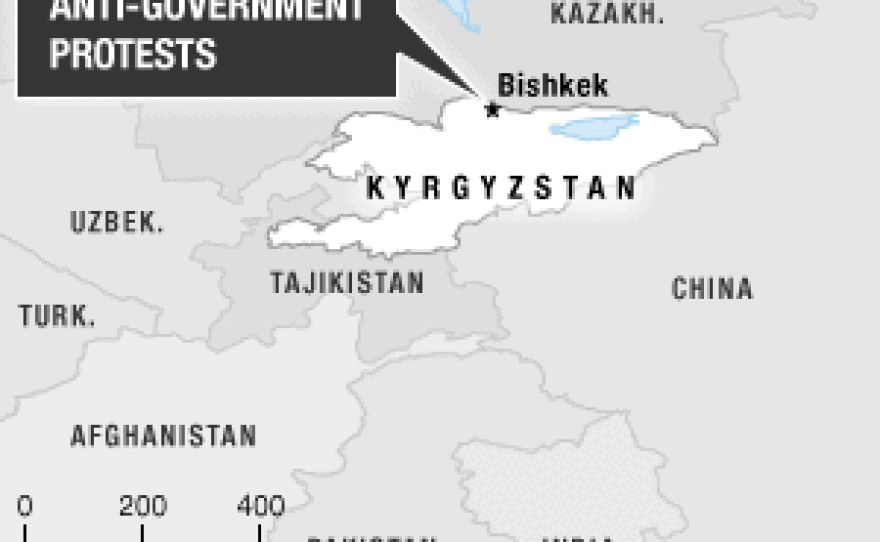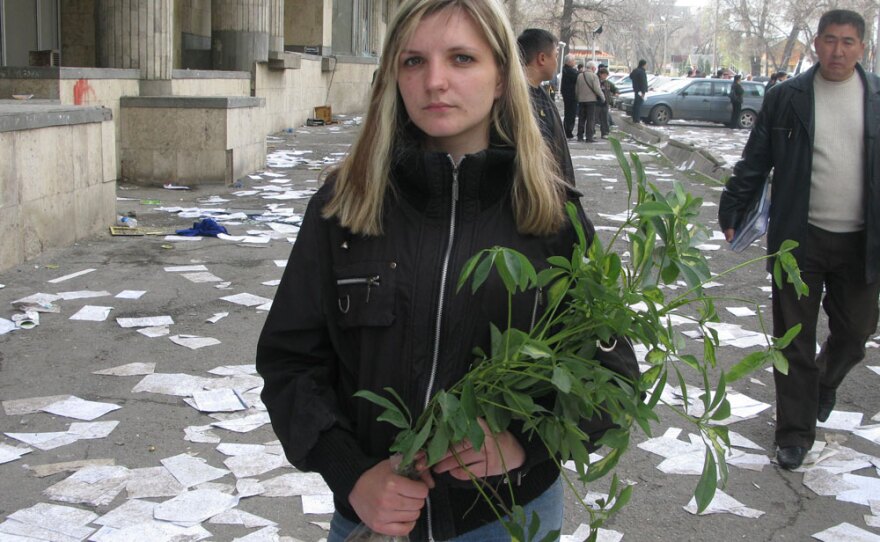Bursts of gunfire erupted throughout the evening Thursday in Kyrgyzstan's capital, Bishkek, and with it came more uncertainty about the future.
After bloody protests this week, the president, Kurmanbek Bakiyev, has conceded that he has lost control of the government. But he refuses to resign.
Meanwhile, opposition leaders have moved ahead and say a new government is in place. The political upheaval has frustrated Kyrgyzstan's citizens, as well as the United States, which relies on a military base in the country to fight the war in Afghanistan.
'We Will Stay Here'
In Bishkek, gangs of looters wandered through the city Thursday night, and there was a general sense of lawlessness. Hotels have asked guests to keep their curtains drawn for safety.

Outside the presidential headquarters, the violence that erupted on Wednesday was gone, but the anger was not.
"In no country, in no country [does the] president have a right to shoot people with guns," said Nurlan Mukambayev, 22, who was standing outside the front gate.
Kyrgyzstan's president was not actually doing any shooting Wednesday, but protesters blame Bakiyev for the police crackdown. The police response to the unrest left 75 people dead, according to the Health Ministry.
Mukambayev said he planted himself outside Thursday to send a message that the streets belong to the people.
"Will we rush away, will we go home, or will we stay here?" he said. "We will stay here."
Dueling Governments
The president, for his part, has left the capital and headed south, to a region where he has more support.
Speaking on Russian radio Thursday night, Bakiyev said that while he may not have any real levers of power, he will not admit defeat.
The president's persistence could make things awkward for an interim government claiming to run the country. Their leader is a former foreign minister, Roza Otunbayeva.
And if any government is watching her every move, it's the United States. Otunbayeva has left open the possibility of shortening a U.S. lease on a military base that American forces use to back the war effort in Afghanistan. Pushing the U.S. military out of this former Soviet space has long been a goal of Russia.
'Kyrgyzstan Will Overcome'
Yet, on the streets of the capital, few people wanted to talk about global politics.

Dasha Vasilenko said she was praying for some kind of fresh start for her country. As if to symbolize that, she climbed through the debris of a smoldering government office building, found a plant that had toppled out of its pot, and walked off with what was left to replant at home.
Kyrgyzstan, she said, must be looking pretty bad right now. She said she understood the need to march on government buildings, but now people are smashing stores where ordinary people work.
It's a shame, she said, that the world is watching and will see this.
And it is quite a turnaround for a country that, after the Soviet Union fell, was considered Central Asia's model of democracy.
"There's no government now. We don't have leaders now," said Rano Kamaldinovna, as she stepped around the ruins of a casino hotel that was torched by protesters. Speaking perfect English, the schoolteacher said people in this impoverished country are more educated than one might think.
"People in other countries should know that I'm sure that Kyrgyzstan will overcome. I think so. I'm sure of it," she said.
Copyright 2022 NPR. To see more, visit https://www.npr.org. 9(MDAzMjM2NDYzMDEyMzc1Njk5NjAxNzY3OQ001))







